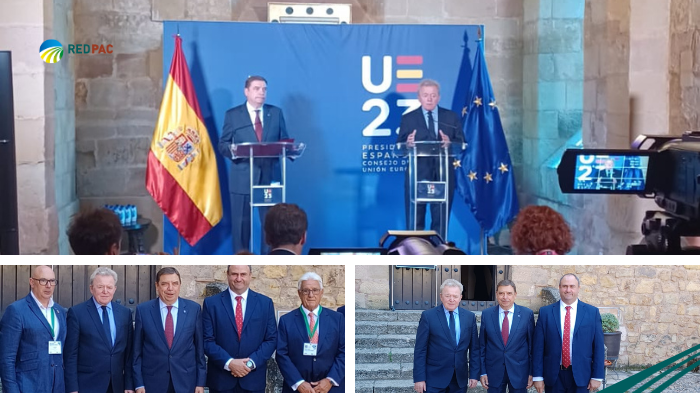
05 de October de 2023
Dinamización rural
The goal was to outline a rural development strategy in Europe through 2040 within the European Commission's "Long-Term Vision for Rural Areas." The Minister of Agriculture, Fisheries, and Food, Luis Planas, highlighted generational change, gender equality, and digital connectivity and services as the main points to be addressed in the European rural policy strategy.
- The objective of the meeting was to adopt decisive conclusions that will shape rural development in Europe until 2040.
- The Forum was opened by Luis Planas, Acting Minister of Agriculture, Fisheries and Food, and by the European Union Commissioner for Agriculture and Rural Development, Janusz Wojciechowski.
- The event has been organized by the Spanish Presidency of the European Union and the Commission
Rural areas represent more than 341 million hectares of the European Union (EU), representing 83% of its total area. 30.6% of the EU population lives in rural areas. Most of them are over 50 years old.
On September 28th, the La Mancha town of Guadalajara, Sigüenza, hosted a "High-Level Forum" on rural policy with the goal of outlining a rural development strategy in Europe through 2040 within the framework of the European Commission's "Long-Term Vision for Rural Areas ." The forum was preceded by a welcoming dinner in honor of the highest representatives of the sector who had come to Sigüenza, as well as a day of visits to projects developed through the LEADER approach in Castilla-La Mancha.
The "High-Level Forum" was opened by Luis Planas, Acting Minister of Agriculture, Fisheries, and Food , and by the European Union Commissioner for Agriculture and Rural Development, Janusz Wojciechowski. Planas emphasized the need to balance urban demand with rural supply. To achieve this, he emphasized the food and territorial autonomy of rural areas, enabling them to enjoy profitable and sustainable economic activity that generates prosperity.
The minister announced that the objective of the Ministry of Agriculture, Fisheries and Food is to promote Conclusions in the Council of the European Union during the Spanish Presidency, on the Long-Term Vision of European Rural Areas, which will be informed by the reflections that have taken place in this Forum.
The CAP and rural development
Mario Milouchev, Director of the Directorate-General for Agriculture and Rural Development in the European Union, announced the presentation of a report on the contribution of the Common Agricultural Policy (CAP) to the "European Rural Vision" strategy by March 2040, when all the data is sufficiently collected. He did confirm that the CAP The CAP allocates 8% of its budget—around €24.6 billion—to rural areas. However, he stated that it is necessary to go further through a multi-fund approach in which support from available funds can complement each other (LEADER, innovation, etc.). And this must be done, because "the CAP contributes to rural development primarily through agriculture , which is not sufficient for rural areas."
For her part, Lidija Pavić-Rogošić, rapporteur of the opinion on the “Long-term vision for rural areas in the EU” from the European Economic and Social Committee (EESC) , explained what she sees as the needs of rural areas: connectivity, digitalization, agriculture and services (health, education, etc.).
The lack of all or most of them, according to Lidija, confirms a palpable reality: "There are fewer and fewer people in rural areas, hence the time to address the 'Long-Term Vision' honestly. Without dividing rural policies from the rural population. A cohesion policy is essential: the CAP is only a small part of rural development. Even so, streamlining bureaucracies to access the Funds is vital. "Bureaucratic complexity prevents projects from being submitted."
Looking beyond current rural policies
Isabel Carvalhais, MEP and rapporteur on the EU Long-Term Vision for Rural Areas from the European Parliament's AGRI Committee, offered a series of practical recommendations for the Vision to create:
- A European rural strategy .
- A paradigm shift in management: a multi-fund perspective , yes, but with clear guidelines and rules.
- Evaluation mechanism for European funds.
- Promote generational change .
For Carvalhais, it is about understanding rural areas from a holistic perspective and supporting companies with a circular economy vision.
Acting Minister Luis Planas also spoke along these lines, emphasizing the idea of "multi-level governance" (national, regional, local) intertwined with a state policy for managing the rural world—that is, a national-level political agreement for rural areas.
At the press conference with the European Union Commissioner for Agriculture and Rural Development, Janusz Wojciechowski, Planas emphasized that the main points to be addressed in a rural policy strategy for both Spain and Europe towards 2040 should be:
- Generational change : special attention to young people
- Gender equality : highlighting the role of rural women
- Digital connectivity and services: full internet access in all territories by 2025 and equal rights to healthcare, education, etc., for residents of rural areas.
All of this, Planas added, is impossible without "a profitable and sustainable economic activity that generates prosperity in rural areas."
Regarding the LEADER approach, Planas confirmed that Spain has doubled the LEADER funding provided by Europe in the new CAP for the 2023-24 period on its own initiative.
LEADER Visits
The Forum concluded on September 29 with a series of visits to local projects developed through the LEADER approach in Castilla-La Mancha:
- Sigüenza Beekeeping Museum and Center , supported by the EAFRD
- Brihuega aromatic plant distillery , supported by the EAFRD
- Brihuega Day Center , supported by FEADER
- Rehabilitation of a textile factory (17th century) into the Castilla Termal Hotel from Brihuega, supported by FEDER and FEADER
You can watch the video of the event from the live stream at this link .









